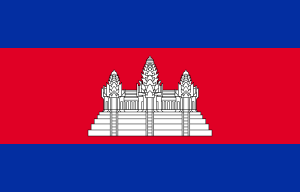Difference between revisions of "Language/Central-khmer/Grammar/How-to-Use-Be"
m (Quick edit) |
m (Quick edit) |
||
| Line 80: | Line 80: | ||
|description=In this lesson, we will learn how to use the verb "be" in Central Khmer. We will look at the different forms of the verb and how to use them in sentences. We will also look at some examples of sentences using the verb "be". | |description=In this lesson, we will learn how to use the verb "be" in Central Khmer. We will look at the different forms of the verb and how to use them in sentences. We will also look at some examples of sentences using the verb "be". | ||
}} | }} | ||
==Related Lessons== | |||
* [[Language/Central-khmer/Grammar/Negation|Negation]] | |||
* [[Language/Central-khmer/Grammar/Pronouns|Pronouns]] | |||
* [[Language/Central-khmer/Grammar/Give-your-Opinion|Give your Opinion]] | |||
* [[Language/Central-khmer/Grammar/Conditional-Mood|Conditional Mood]] | |||
* [[Language/Central-khmer/Grammar/Gender|Gender]] | |||
* [[Language/Central-khmer/Grammar/Plurals|Plurals]] | |||
* [[Language/Central-khmer/Grammar/Questions|Questions]] | |||
* [[Language/Central-khmer/Grammar/Adjectives|Adjectives]] | |||
{{Central-khmer-Page-Bottom}} | {{Central-khmer-Page-Bottom}} | ||
Revision as of 23:56, 28 February 2023
Hi Central Khmer learners! 😊
In this lesson, we will learn how to use the verb "be" in Central Khmer. We will look at the different forms of the verb and how to use them in sentences. We will also look at some examples of sentences using the verb "be".
The verb "be" is used to describe a state or condition. In Central Khmer, it is conjugated differently depending on the subject of the sentence. The verb "be" can be conjugated in the present, past, and future tenses.
The present tense of the verb "be" is conjugated as follows:
| Central Khmer | Pronunciation | English Translation |
|---|---|---|
| ខ្ញុំគឺ | kɲom kəy | I am |
| អ្នកគឺ | nək kəy | You are |
| គាត់គឺ | kat kəy | He/She is |
| យើងគឺ | yəəng kəy | We are |
| អ្នកទាំងអស់គឺ | nək təəŋ ɑsɑh kəy | You all are |
| ពួកគេគឺ | puk kəy | They are |
The past tense of the verb "be" is conjugated as follows:
| Central Khmer | Pronunciation | English Translation |
|---|---|---|
| ខ្ញុំបានគឺ | kɲom bɑn kəy | I was |
| អ្នកបានគឺ | nək bɑn kəy | You were |
| គាត់បានគឺ | kat bɑn kəy | He/She was |
| យើងបានគឺ | yəəng bɑn kəy | We were |
| អ្នកទាំងអស់បានគឺ | nək təəŋ ɑsɑh bɑn kəy | You all were |
| ពួកគេបានគឺ | puk bɑn kəy | They were |
The future tense of the verb "be" is conjugated as follows:
| Central Khmer | Pronunciation | English Translation |
|---|---|---|
| ខ្ញុំនឹងគឺ | kɲom nɨŋ kəy | I will be |
| អ្នកនឹងគឺ | nək nɨŋ kəy | You will be |
| គាត់នឹងគឺ | kat nɨŋ kəy | He/She will be |
| យើងនឹងគឺ | yəəng nɨŋ kəy | We will be |
| អ្នកទាំងអស់នឹងគឺ | nək təəŋ ɑsɑh nɨŋ kəy | You all will be |
| ពួកគេនឹងគឺ | puk nɨŋ kəy | They will be |
Now let's look at some examples of sentences using the verb "be":
- Person 1: ខ្ញុំគឺមិនចង់បានអីទេ (kɲom kəy mɨn cɑŋ bɑn ʔi təy) (I don't want it)
- Person 2: អ្នកបានចង់អីទេ (nək bɑn cɑŋ ʔi təy) (You want it)
- Person 1: យើងនឹងចូលទៅដល់ថ្ងៃអាទិត្យ (yəəng nɨŋ cəul təv dɑl tɑj ʔɑtit) (We will go to the beach tomorrow)
- Person 2: ពួកគេនឹងចូលទៅដល់ថ្ងៃអនាគត (puk nɨŋ cəul təv dɑl tɑj ʔɑnek tət) (They will go to the park on Sunday)
As you can see, the verb "be" is used to describe a state or condition. It is important to know how to conjugate the verb "be" in Central Khmer in order to communicate effectively. To improve your Central Khmer Grammar, you can also use the Polyglot Club website. Find native speakers and ask them any questions!
➡ If you have any questions, please ask them in the comments section below.
➡ Feel free to edit this wiki page if you think it can be improved. 😎
Related Lessons
